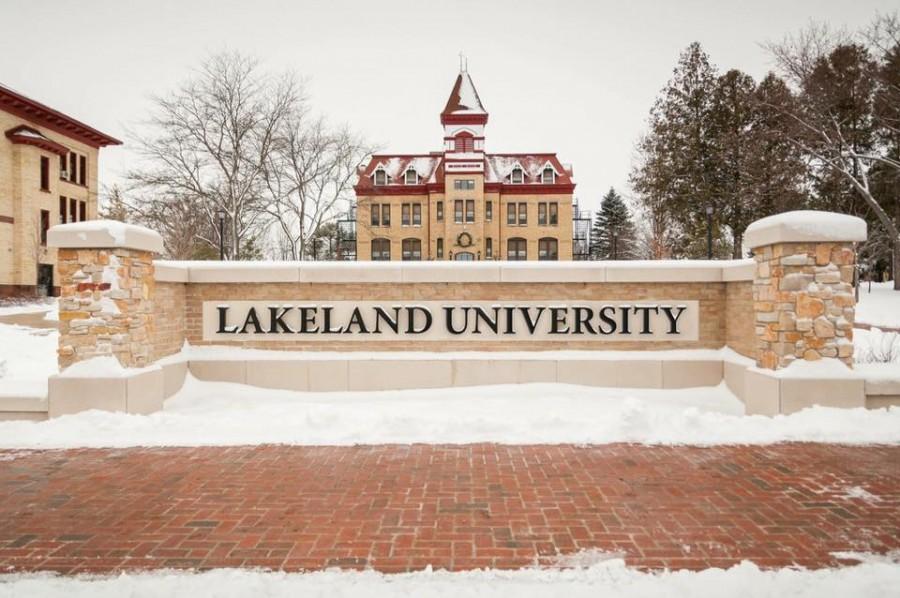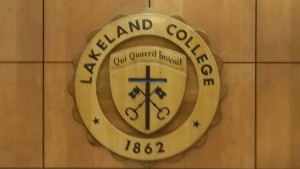College to University: more than just a word
February 25, 2016
Lakeland College, in its 154-year history, has evolved quite a bit over its lifetime. The changes began when the name Lakeland was implemented in place of the former Mission House title for the college.
Soon another change in branding will be realized when, on July 1, 2016, Lakeland College will become Lakeland University.
Students may be wondering why Lakeland is changing its name.
Dan Eck, president of Lakeland College said, “Having a name change at this point in time will help with a lot of the efforts that we are making with respect to positioning us in the marketplace, telling the Lakeland Story, helping our students get the internships, jobs and access to graduate schools that we want to see them have.”
The changing of the name has little to do with any growth at Lakeland. Eck said, with respect to the name change, “I think it’s catching up with the evolution of the college over the last 20 years or so.”
Eck said, “It all pairs together, the changes were doing in programming will pair nicely with the change in name. There are some new academic programs that we are working on that we are very excited about.”
The University will be comprised of three separate schools, according to Beth Borgen, vice president for advancement, “The School of Business and Entrepreneurship, The School of Science, Technology and Education, and The School of Humanities and Fine Arts.”
The three schools will take in all of the current academic divisions at the college and each school will have its own dean. There are definite advantages to the University structure over that of a single college structure.
Eck said, “The individual programs within a school will have the opportunity to make changes to their curriculum in a more expedited manner, they can be more reactive to what the students need.”

With the creation of three schools it may seem like there will be more staff required. According to Eck, the additions to staff will be “minimal,” but there will be the addition of a provost position to the university, which is “the chief academic officer of a university,” said Eck.
Also, there will not be significant funding differences between the schools, according to Eck.
The name change will help people understand the depth of education at Lakeland versus that of other colleges.
Eck said, “Calling ourselves a university will help people understand that we have quite a bit to offer, multiple locations around the state and in Japan. I think that name change will signify more accurately who we are.”
The name change may also help in the growth of the college.
Borgen said, “we certainly anticipate some kind of growth based upon the experience of other colleges that have transitioned to university.” She added,“University may be more appealing for those who are going into graduate programs.”
Name changes are not something that are uncommon in the world of higher education. Eck said “Over the past 15 years, virtually every institution that could legitimately call itself a university has moved to call itself a university.”
According to Eck, it is going to cost the college roughly $600,000 to implement the name change throughout all of the college’s seven locations.
Eck said, “This is money that has been earmarked in reserve for this.”
In addition, there will also be some internal operating costs, but the primary costs are associated with the need for new signage. Students can expect the change of signage for the bridge and the monument at the corner of county roads A and M to be done “quickly,” according to Eck.
However, not all of the campus signage will change with the changing of the name. Eck said, “the big wooden seal that is in the dining hall stairwell will not be changed. That’s going to be kind of a legacy piece. We will put a plaque by it that will talk about the change to Lakeland University.”
Those who see the Lakeland name change as misrepresentative are urged to look at the size of the college beyond the Sheboygan campus.
Borgen said, “We have another 3,000 students out there who are non-traditional students, who are adult learners, who are in our graduate programs. The number of students we have in those programs qualifies us to be a university.”
It is not only an advantage for the college to be called a university, it is also advantageous to those who accredit Lakeland. Borgen said, “We are already considered a university by the higher learning commission.”
There have been questions raised about how the name change will affect alumni, in particular new graduates. Borgen said, “As of now, the diploma in May will be Lakeland College. We won’t officially be Lakeland University until July 1. Alums or any graduates are certainly welcome to order a reprint of the diploma under Lakeland University, if they choose.”
The name change has justification outside of the confines of Lakeland. Lakeshore Technical College in Cleveland, Wis. is commonly mistaken for Lakeland College.
Eck said, “Not a week goes by where there is not some level of confusion between our two institutions, even from our own accreditors and regulatory agencies, because Lakeshore Technical College and Lakeland College sound very similar.”
Borgen and Eck both said, “The reaction was overwhelmingly positive from alumni,” in response to the name change.
“I think from the student base it has been similarly positive,” said Eck. “I understand that there is a little bit of nervousness about it from people, wondering what this really means.”
Eck added, “The Lakeland name is what is important to me.”
For more information on the name change, go to http://lakeland.edu/Special/name-change.




Wendy Pongratz • Feb 28, 2016 at 12:28 am
I like the idea of multiple schools to expand the growth of Lakeland, but doesn’t it kind of take away the liberal arts meaning to the college? Would alumni have to change the name to “Lakeland University” on resumes and our degrees? I wouldn’t want employers to think that any of us are lying about graduating from Lakeland.